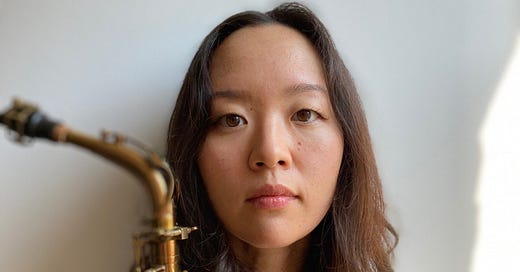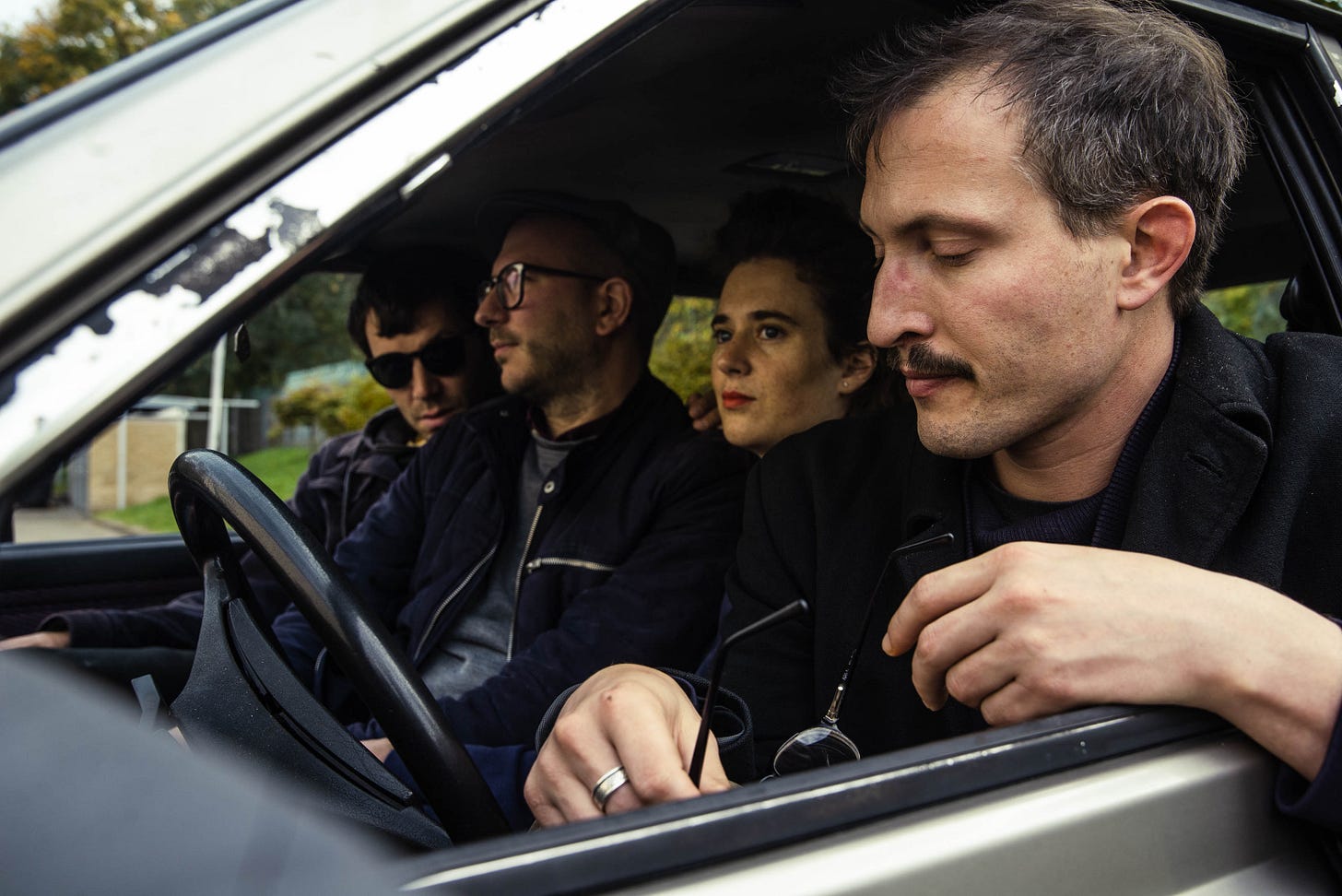I’m publishing this week’s newsletter from Chicago, where I arrived yesterday. I’m here for the 2024 edition of Frequency Festival, which begins on Tuesday, February 20 with a split bill featuring BCMC, the transportive duo of Cooper Crain and Bill MacKay, and andPlay, an equally transportive duo—even if the modes and destinations differ—with violinist Maya Bennardo of Mivos Quartet and violist Hannah Levinson. If you’re in Chicago I do hope you’ll come out to this and/or other nights of the festival. Please check out the full line-up here: Nate Wooley, Sarah Saviet, Jessika Kenney & Eyvind Kang, Zarabanda Variations, Ellen Arkbro, Ensemble Dal Niente, Austin Wulliman, and Cory Smythe.
Due to these activities I won’t be publishing Nowhere Street next week. The recommended concert listings for Berlin cover two weeks instead of the usual one.
Mai Sugimoto Gets Connected
When I left Chicago in 2018 saxophonist Mai Sugimoto was starting to really make her presence felt. I had first heard the Japanese native in Hanami Quartet, in which she and guitarist Andrew Trim reflected on the melodies they both heard as children growing up in Japan—whether classical and folk traditions or children’s music. She possessed a rare equanimity among the players she worked with, where her connection to jazz tradition, as well as a healthy musical curiosity, was notable. I hadn’t really kept up with her playing since then, even though I’ve seen that she’s become a more prominent presence on the scene, including a role on the most recent album from Joshua Abrams’ Natural Information Society, Since Time is Gravity (Eremite/Aguirre).
A couple of weeks ago she released a new trio album titled Sunlight Filtering Through Leaves, recorded with Abrams and drummer Isaiah Spencer. Her impressive company led me to check it out, and I’m glad I did. In fact, it made me check out a couple of strong albums she’s made over the last few years that I hadn’t previously heard. In the fall of 2018 she released a terrific quartet album called Born/Raised (AsianImprov), a buoyant post-bop session with trumpeter Quentin Coaxum, bassist Katie Ernst, and drummer Charles Rumback that flirts with some Ornette-ish polyphony. There are a couple of improvised pieces and another old Japanese melody, but Sugimoto wrote the other tunes. Smudged by the attractively draggy time of Rumback it conveys much more spark and nuance than your average post-bop record, but with her 2021 solo recording monologue she indicated something deeper, a series of solitary excursions on her usual alto saxophone along with various percussions and flutes. The record doesn’t blow my mind, but it does reveal a different side of Sugimoto’s musical personality.
All of that seems to come together on Sunlight Filtering Through Leaves, beautifully recorded by Ken Christiansen, a veteran Chicago engineer that has really connected with a new generation of local players. The trio first came together in 2020 for a video tribute to Fred Anderson, both of whom Abrams and Spencer often played. I don’t know if Sugimoto had made it out to any of the Sunday jam sessions at the Velvet Lounge, but since she arrived in Chicago in 2007 it’s more than likely she did. Either way, I’m glad the band stuck it out, because I’ve been having a blast listening. On the more driving tunes the Ornette influence of yore fades into something more elliptical, as she breaks down phrases with the muscle and rigor of vintage Sonny Rollins spiked with a more feverish tone that clearly connects her to the ESP soul-streaked blowers like Charles Tyler. This isn’t a record that will throw you for a loop, but it’s a testimony to her emergence as an imaginative and resourceful improviser with no allegiance to any clear style. The rhythm section gives her a lot to work with, whether on hard-swinging material like the opener or the meditative, shape-shifting ballad “Komorebi,” which you can hear below.
Sugimoto, regularly pushing into the lower register of her alto, has never sounded stronger and more assured, but what really knocks me out about the record is how transparent it is. Still, the trio manages to channel something ineffable in the recording situation, letting feel and groove take over. This is community music that is more about connection than virtuosity—which is surely present, but never ostentatiously so. On “Little Dance” Sugimoto moves to flute amid gently percolating balafon sounds played by Spencer on an old Roland Handsonic 10, as a hypnotic bassline eventually ramps up into a driving groove, with Sugimoto switching to hand percussion. That’s followed by the lengthy “What Are You,” a deep groover where you can hear either Abrams or Spencer letting out some pleased moans, a self-evident sound of approval. The trio are feeling it and halfway through Sugimoto walks into a phrase from the Thelonious Monk tune “Jackie-ing”, which she picks up on and considers for a few bars, before moving on to something else. It conveys that singular joy of good improvised music, when it’s not about ripping solos but group unity. Naturally, I’m advising you all to pay close attention to Sugimoto from here on out.
Lumpeks: Storytelling is the Oldest Tradition
It’s no secret that I’m an ardent admirer of the work produced by the vast network of European musicians involved with Umlaut Records, a multi-city endeavor that these days focuses mostly on Paris while still reflecting what’s happening in Berlin, as recently documented when I wrote about Oùat a couple of weeks ago. I’d had a similar epiphany when I heard the eponymous debut album from Lumpeks a few years ago. I already knew about cornetist Louis Laurain and alto saxophonist Pierre Borel—bandmates in Die Hochstapler with an uncanny rapport that echoes the ease with which Don Cherry and Ornette Coleman danced around the latter’s indelible themes—and I knew double bassist Sébastien Beliah through the Umlaut Big Band and Un Poco Loco. But here they were in the company of singer, percussionist and folklorist Olga Kozieł from the Lublin region of Poland.
Upon discovering Polish folk through some colleagues Beliah was so taken he moved to Lublin, where he met Kozieł. Eventually they enlisted Laurain and Borel, who brought an undeniably jazzy flair to the vibrant, rough-hewn arrangements. I loved the debut album which, as I wrote somewhere, suggested what Coleman’s classic quartet might sound like in the Polish countryside. Of course, that was a crude reduction, and after getting to hear the band play live it became clear how fluid and spontaneous its arrangements were. They borrowed melodies and texts, but they were sculpting new objects from old materials, usually in real-time. The improvisational ethos took some of those signposts into the shed and onto the bandstand, where they were reassembled in new ways.
When I saw that Lumpeks had a new album coming I assumed it would be more of the same. I make stupid assumptions all of the time. Now I feel dumb. Polonez builds wildly on the years the quartet has spent together on the road. In the lead-up to making the album the group participated in loose jam sessions in Poland with local folk musicians, stretching, learning, and toying with an expanding repertoire. Rather than absorb a new tradition politely, with prim deference, Laurain and Borel fuck it up, but their woolly interpretations are clearly a sign of love and respect for the material. It’s their way of saluting the tradition in the most sincere and authentic fashion possible. In a recent Wire story on the band Laurain says, “Pierre and I are imposters—but on purpose,” using the English translation of Die Hochstapler to inject some playfully sly double meaning. The four-way interplay is far more balanced and unified on the second album, as if any member could reference any tradition that makes sense. Kozieł even plays trumpet on one track, doubling the brass section on “Café des sports.”
Most of the music rides a numbing, imperturbable groove sketched out with terse, almost metronomic arco stabs from Beliah—a staple of folk dance from Eastern Europe. But that occasional rhythmic fixity doesn’t hold things back. On “Le souterrain” the horns deliver loosely connected phrases, as if one of the puzzle pieces bridging their sound has gone missing, asking us to fill in the blank. There’s a lot of that in the deft interplay between Laurain and Borel, and their sonic connection coexists within a larger landscape of cooperation and playful challenges. “Sobota na basenie” is largely a showcase for Laurain’s phenomenal extended technique, but with the loose limbed percussive accompaniment you can’t miss the narrative essence of his solo work, which is what really makes it stand out. (Check out his incredible solo album from last year, Le Bargy). Kozieł doesn’t really mess with the hectoring style long embedded in the tradition, but she does play with phrasing and timing like Captain Beefhear or something. She can’t help be the center of attention when she singing, but that just gives everyone else extra freedom.
Suddenly, the divide between pure experimentalism and folk music disappears. I’m leery of pronouncing some new golden age, but there is a mounting interest in the sort of communal, border-free utopia of Don Cherry’s Organic Music Society. These days such “other musics” aren’t that exotic or unfamiliar, so a straight mash-up just seems like a Womex showcase, which this is not. It’s hard learning a tradition only to mimic it. The members of Lumpeks weave all of these things within a larger improvisational landscape. It’s all off the dome, except the dome is a repository of this tradition or that, or some splat in between. From one track to another there might be a particular strain than dominates, and some are flat-out outliers (read: holy shit), like the sustained, beat-marbled drone of “Piątek w domu,” but its power comes mostly from the fact that it’s on the same record as a ballad as gorgeous as “Kujawiak kombinowany,” with guest violinist Maria Stępień, both of which I’ve conveniently embedded below. Get with it.
Recommended Shows in Berlin for the Next Two Weeks
February 20: Andrea Parkins, accordion, electronics, percussion, Gert-Jan Prins, electronics, percussion, and Raed Yassin, double bass, electronics, 8:30 PM, Morphine Raum, Köpenicker Straße 147, 10997 Berlin (Hinterhof 1. Etage)
February 21: Michael Moore, reeds, Antonio Borghini, double bass, and Joe Hertenstein, drums, with Achim Kaufmann, piano, 8:30 PM, Sowieso, Weisestraße 24, 12049 Berlin
February 21: Rudi Mahall, clarinet, Simon Sieger, trombone, Joel Grip, double bass, and Michael Griener, drums, 8 PM, Zum Schwalbenschwanz, Margaretenstraße 22, 10317 Berlin
February 23: Silke Eberhard & Ulrich Gumpert; Aki Takase & Daniel Erdmann, 8 PM, Industriesalon Schöneweide, Reinbeckstraße 10, 12459 Berlin
February 24: Oren Ambarchi; Jack Callahan & Jeff Witscher; Auguste Vickunaite, 9 PM, Roter Salon, Rosa-Luxemburg-Platz, 10178 Berlin
February 26: The Heliocentrics, 8:30 PM, Gretchen, Obentrautstr. 19-21, 10963 Berlin
March 1: Fredrik Rasten; Quentin Tolimieiri, piano; Katie Porter, bass clarinet, Werner Dafeldecker, double bass, 8: 30 PM, Sowieso, Weisestraße 24, 12049 Berlin
March 2: Jards Macalé, 8:30 PM, Gretchen, Obentrautstr. 19-21, 10963 Berlin
March 4: Lux Quartet (Myra Melford, piano, Dayna Stephens, saxophones, Allison Miller, drums, and Scott Colley, double bass), 9 PM, Zig-Zag Jazz Club, Hauptstraße 89, 12159 Berlin






I am here because a I am producing an Ethan Iverson show in Palo Alto California EIght weeks from tonite (and I stylized "eight" with a capital E, I for Ethan Iverson) and Ethan sings your praises which is probably legit in both directions and not log-rolling or rogue-lol-ing which nobody ever wrote before and AI could never think of EIther or aether.
Makes me want to ring my old friend Charles Rumback....
I think Ethan only mentioned you to me so that I would splash all over your sub stack and not his.